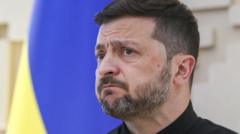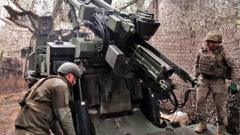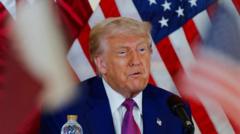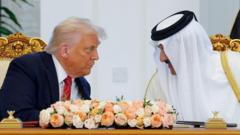The long-awaited peace talks between Russia and Ukraine commence in Istanbul, but expectations for a resolution remain low amid diplomatic tensions and logistical uncertainties.**
Uncertain Journey: Russia and Ukraine Begin Peace Talks in Istanbul**

Uncertain Journey: Russia and Ukraine Begin Peace Talks in Istanbul**
Initial negotiations come amidst skepticism and pressure on both sides as they seek a resolution to the conflict.**
Following a prolonged period of hostilities, representatives from Ukraine and Russia are set to gather in Istanbul for their first direct peace negotiations since the onset of the conflict. Despite the significance of this meeting, there is a pervasive sense of skepticism regarding the potential outcomes, particularly from global leaders like President Trump, who have publicly called for dialogue.
In a twist to the ongoing turmoil, Russian President Vladimir Putin announced plans to dispatch a delegation to Turkey for discussions. This came after he rejected calls for a cease-fire, a demand strongly advocated by Ukraine and most Western allies as a prerequisite for dialogue. The Russian contingent arrived in Istanbul ready to engage, intensifying the pressure on Ukrainian President Volodymyr Zelensky.
Amidst the flurry of diplomatic maneuvering, Zelensky expressed doubts about the seriousness of Russia’s intentions, particularly regarding how the talks were arranged. Despite these concerns, he decided to send a high-level Ukrainian delegation, led by the defense minister, as a show of respect for both President Trump and Turkey's President Erdogan.
Zelensky articulated his apprehensions following discussions with Erdogan, noting the absence of concrete details about the negotiations: no designated time, no set agenda, and a lack of high-ranking officials in the Russian delegation. He remarked, “I think Russia’s attitude is unserious,” reflecting the growing uncertainty surrounding the critical talks. As the world watches, the stakes remain high for both nations grappling with a protracted and devastating war.
In a twist to the ongoing turmoil, Russian President Vladimir Putin announced plans to dispatch a delegation to Turkey for discussions. This came after he rejected calls for a cease-fire, a demand strongly advocated by Ukraine and most Western allies as a prerequisite for dialogue. The Russian contingent arrived in Istanbul ready to engage, intensifying the pressure on Ukrainian President Volodymyr Zelensky.
Amidst the flurry of diplomatic maneuvering, Zelensky expressed doubts about the seriousness of Russia’s intentions, particularly regarding how the talks were arranged. Despite these concerns, he decided to send a high-level Ukrainian delegation, led by the defense minister, as a show of respect for both President Trump and Turkey's President Erdogan.
Zelensky articulated his apprehensions following discussions with Erdogan, noting the absence of concrete details about the negotiations: no designated time, no set agenda, and a lack of high-ranking officials in the Russian delegation. He remarked, “I think Russia’s attitude is unserious,” reflecting the growing uncertainty surrounding the critical talks. As the world watches, the stakes remain high for both nations grappling with a protracted and devastating war.






















